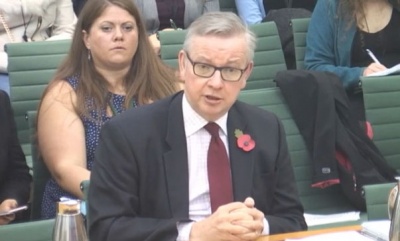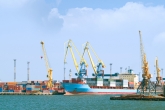Gove admits to not giving 'sufficient thought' to imminent China ban
Environment Secretary Michael Gove says he has “not given sufficient thought” to the possible impacts of China’s ban on 24 grades of waste material, due to begin on 1 January.
Gove was speaking to the Environmental Audit Committee (EAC) to answer questions on the government’s environmental policy, and gave his views on a range of topics including agriculture, chlorinated chicken and enforcement of environmental regulations following Brexit.

In 2015, the UK exported around 4.5 million tonnes of its waste to China for recycling or recovery, almost one-third of its exported waste. In 2016, 74 per cent of the waste paper the UK exported went to China, while in 2016, 55 per cent of the UK’s exported recovered plastics went to China and Hong Kong.
However, when asked what impact the Chinese ban might have on the UK’s waste economy and what preparations the government is making, Gove simply replied: “I don’t know what impact it will have. It’s a very good question and one to which, I will be completely honest, I have not given sufficient thought.”
Labour MP Anna McMorrin pointed out that the ban is due to come into play in eight weeks’ time and asked whether the UK has enough capacity to process the extra material that it would be forced to retain as a result, or whether there is a risk of stockpiles of material that would otherwise be sent to China building up or being sent to landfill.
“I don’t believe so. I think we do have the capacity. I think one of the striking things about our waste industry is how energetic, ambitious and innovative it has proven itself to be, even as we place tighter regulations on how it operates. We will be seeing more about what we aim to do in this space in the 25-Year Environment Plan, but I don’t have any worries.”
The waste industry, however, does have worries, and several public calls have been made by waste associations for the government to intervene in an attempt to make the ban more reasonable with regards to required contamination levels (China will limit all imported recycled materials to a maximum contamination level of 0.3 per cent, one that WRAP CEO Marcus Gover says will be ‘very challenging’ with much of the UK’s waste ‘nowhere near’ this level) and the domestic response to an upheaval in the destination of large swathes of our waste for recycling.
After being handed a briefing sheet by an advisor and being told that the waste industry is much more worried than he appears to be, Gove added: “This ban will affect everyone apart from China, and I believe the European Commission has made representations to Beijing as indeed our own embassy has. But the fact is that this decision is one with which we all have to deal.”
It is indeed not just the UK that stands to be rocked by the Chinese action. In 2016, China imported 28.5 million tonnes of recovered paper, with 3.9 million coming from the UK, 12.8 million from the USA and Japan, Canada, the Netherlands and Italy all sending over a million tonnes. Some 8.4 million tonnes of plastics is estimated to have been exported to China in 2016: 441,000 from the UK and over 1.4 million from the USA and Japan.
Regardless, Gove seemed unphased: “We may lament it from one point of view. On the other hand it may be an example of, as President Xi has shown, a higher degree of ambition of environmental standards. So I might deprecate the manner in which the announcement was made and the speed with which the change has been brought about, but I can understand why President Xi and his team choose to make this decision.”
The Chinese government submitted its notification to the WTO on 18 July, but only gave until 20 July for comments to be submitted. One request from the industry, made in August by the Recycling Association and Confederation of Paper Industries, asked the government to negotiate an extension with the Chinese government to give the industry time to co-operate with China on improving recyclate quality.
Gove’s appearance in front of the EAC came just a day after Resources Minister Therese Coffey gave evidence for the committee’s inquiry on disposable packaging. Asked then about the China situation, Coffey said it would be “a headache and an opportunity” for the UK.
She explained: “It’s a good challenge to us in our industry and to us as a country about how we improve the quality of the waste that we have, and there’s opportunities to process more waste here rather than exporting it to the other side of the world just because it’s a bit cheaper to do so.”
She added that China’s ban could stimulate the UK market and that Defra had “encouraged the industry to provide the capacity that they believe we need”, but provided no indication of proactive action on the government’s part. Green Party Co-Leader and committee member called the government’s response to the imminent issue as “lackadaisical”.
Indeed, at the CIWM Presidential Dinner on 17 October, Coffey admitted that she had not read the letter sent to her by the Resource Association, Environmental Services Association, Recycling Association, and Confederation of Paper Industries (CPI) three weeks earlier.
She told the crowd made up of waste industry stakeholders: “I wasn’t surprised by trade press reports of a plea from some parts of the industry that I had to head to China to plead with the Chinese government to oppose their tightening of standards of imports. I still haven’t seen the letter, by the way, and I am sure civil servants are crafting some Rolls Royce response. I recognise that this causes a headache but actually we should see this as an opportunity.”










